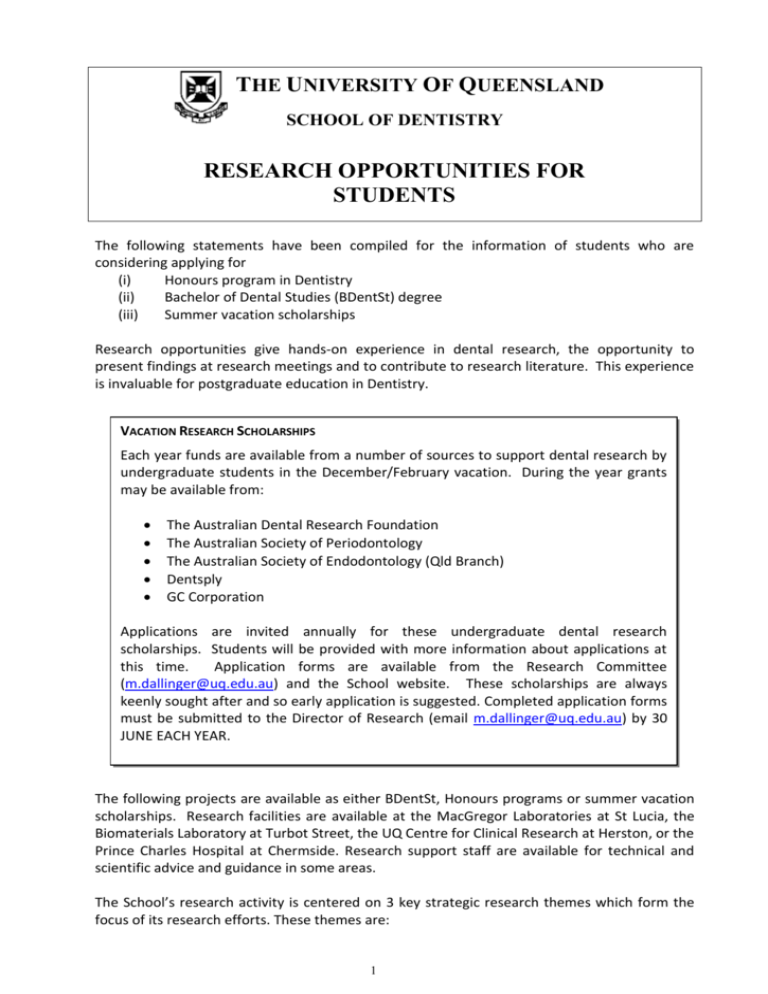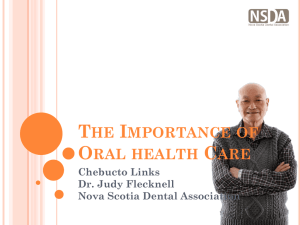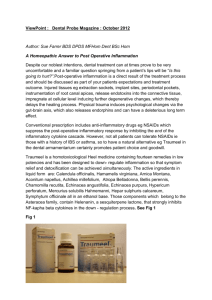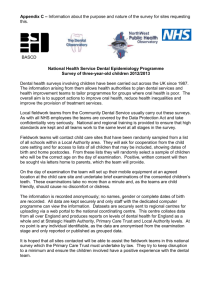research opportunities for undergraduate students
advertisement

THE UNIVERSITY OF QUEENSLAND SCHOOL OF DENTISTRY RESEARCH OPPORTUNITIES FOR STUDENTS The following statements have been compiled for the information of students who are considering applying for (i) Honours program in Dentistry (ii) Bachelor of Dental Studies (BDentSt) degree (iii) Summer vacation scholarships Research opportunities give hands-on experience in dental research, the opportunity to present findings at research meetings and to contribute to research literature. This experience is invaluable for postgraduate education in Dentistry. VACATION RESEARCH SCHOLARSHIPS Each year funds are available from a number of sources to support dental research by undergraduate students in the December/February vacation. During the year grants may be available from: The Australian Dental Research Foundation The Australian Society of Periodontology The Australian Society of Endodontology (Qld Branch) Dentsply GC Corporation Applications are invited annually for these undergraduate dental research scholarships. Students will be provided with more information about applications at this time. Application forms are available from the Research Committee (m.dallinger@uq.edu.au) and the School website. These scholarships are always keenly sought after and so early application is suggested. Completed application forms must be submitted to the Director of Research (email m.dallinger@uq.edu.au) by 30 JUNE EACH YEAR. The following projects are available as either BDentSt, Honours programs or summer vacation scholarships. Research facilities are available at the MacGregor Laboratories at St Lucia, the Biomaterials Laboratory at Turbot Street, the UQ Centre for Clinical Research at Herston, or the Prince Charles Hospital at Chermside. Research support staff are available for technical and scientific advice and guidance in some areas. The School’s research activity is centered on 3 key strategic research themes which form the focus of its research efforts. These themes are: 1 1) 2) 3) Diagnosis and prevention of oral disease Dental biomaterials and advanced technologies Oral and systemic health interactions These themes are embodied and undertaken in the form of Research Programs. Research Programs are defined as large collaborative research projects, which typically are researched by teams consisting of senior and junior academics, postdoctoral research fellows, and Research Higher degree and Honours students. Each researcher investigates an aspect of a larger problem with their insights contributing to the resolution of the larger problem under the coordination and guidance of the research program leader. The research leader’s role in formulating the research program, managing the team’s research, and drawing together the threads of the answer are critical. The School currently supports 5 Research Programs which include: 1. Paediatric Caries 2. Oral Cancer 3. Efficient Effective Endodontics 4. Applied Dental Biomaterials 5. Oral Inflammation and Atherosclerosis It is expected that students will undertake their research in one of these research programs. Students who are interested in obtaining more details about particular projects should speak to the program leaders concerned. Research Programs 1. Paediatric Caries Research Program Program leader: Associate Professor W. Kim Seow Program members: Academic & Research Staff: Associate Professor Kim Seow, Dr Annetta Tsang, Dr Phil Bird Queensland Health Dental Staff: Dr Trevor Holcombe, Dr Bruce Newman External Academic Staff: Dr Diana Battistutta (Biostatistical epidemiologist, QUT), Dr Adrian Barnett (Biostatistician, QUT) Postgraduate students: Sonali Mistry (PhD), Kathryn Plonka (PhD), Margaret Pukallus (MPhil), Wayne Kan (DClinDent), Sue Taji (DClinDent) Program Summary: The Paediatric Caries Research Program falls under the “Diagnosis & Prevention of Oral Disease” research theme, and has a multi-focus approach to caries research. The research is both clinical and laboratory-based including microbiological investigations. Studies examine models of caries, diagnosis, prevention and management in children. Current research projects examine the aetiology and risk factors for Early Childhood Caries, efficacies of intervention programs and cost-benefits of prevention, and treatment strategies of caries in children. The work of the group is undertaken at clinical facilities at Kingston and Logan, and supported by facilities at the MacGregor laboratories at St Lucia. This program is funded by grants from Queensland Health and the Australian Dental Research Foundation. 2 2. Oral Cancer Research Program Program leader: Dr Camile S Farah Program members: Academic & Research Staff: Dr Jodi Saunus (Postdoctoral Research Officer), Dr Terry Maybury (Postdoctoral Research Officer), Ms Sarah Wagner (Research Assistant), Mr Anthony Chan (Histology Technician) Postgraduate students: Dr Ahmad Abdul Majeed (PhD), Dr Glenn Francis (PhD), Ms Sandra Stein (PhD), Dr Tess Matias (PhD) Honours students: Lidiya McIntosh, Kate Amos, Julijana Nikolovski, Nick Lynch Program Summary: The Oral Cancer Research Program falls under the “Diagnosis & Prevention of Oral Disease” research theme, and leverages work regarding various bio-markers of oral cancer and oral epithelial dysplasia which are either unique to the oral mucosal situation or shared across malignancies in other sites. The program leverages a range of novel technologies, including optical fluorescence imaging to be able to diagnose oral cancer at its earliest stages, thus allowing early forms of treatment to be applied with maximal effect. The program is also investigating the role that cancer stem cells play in the propagation and recurrence of cancerous and pre-cancerous lesions. The underlying premise of this program looks at creating a molecular signature for pre-cancerous conditions that can be used as a diagnostic test to either replace or supplement standard histopathological interpretation of oral epithelial dysplasia and oral squamous cell carcinoma. Furthermore, the program is interested in the role that cytokines, particularly IL-12/IL-23, play in oral mucosal diseases and wound healing, and their contribution to tissue damage through unregulated inflammation. The program is also active in educational research, and leads a multi-disciplinary project incorporating virtual microscopy and computer-assisted learning into UQ courses in dentistry, veterinary science, biomedical science, and medicine. The specific outcome for this project is to enhance the learning and teaching of microscopy across a wide range of disciplines, by systematically implementing state-of-the-art virtual microscopy, a highly flexible, innovative and dynamic learning tool, in conjunction with an interactive approach to learning designed to maximise student engagement with this innovative technology. The work of the group is undertaken at the newly established UQ Centre for Clinical Research based at the Royal Brisbane & Women’s Hospital at Herston. This program is funded by grants from the National Health & Medical Research Council, the Carrick Institute for Learning & Teaching in Higher Education, and the Australian Dental Research Foundation. 3. Efficient Effective Endodontics Research Program Program leader: Professor Laurie Walsh Program members: Academic & Research Staff: Dr Bill Kahler, Dr Phil Bird Adjunct academic staff: Dr Basil Athanassiadis, Dr Ralph Reid Members of the Brisbane Endodontic Research Group: Dr Roger Clarkson, Associate Professor Alex Moule Postgraduate students: Raghad Hmud (PhD), Roy George (PhD), Fardad Shakibaie (PhD), Andrew Thomson (DClinDent), Quan Ho (DClinDent), Peter Case (DClinDent), and Edward Houston (DClinDent). 3 Program Summary: The EEE (“Triple E”) research program falls within the “Dental Biomaterials and Advanced Technologies” research theme of the School, and is focused on the goal of achieving quality biological and mechanical outcomes in endodontic treatment, using improved methods and novel technologies. The research spans a crown-to-apex approach and addresses the individual phases of treatment, from diagnosis through to final obturation. Recent work has examined the characteristics and performance of medicaments and root canal sealing materials. Current research work in the EEE program is exploring improved irrigant technologies and the use of pressure waves created by pulsed lasers to improve bacterial killing and smear layer removal in the root canal system. Several papers from this group are in the 2008 volume of the Journal of Endodontics. The group has substantial industry connections and has attracted substantial support for major equipment. Current research projects include the detection of bacterial biofilms in the root canal, improved irrigation solutions and techniques, reactive oxygen technologies for root canal disinfection, laser methods for biomechanical root canal preparation, enhanced endodontic medicaments with antimicrobial properties, and long term stability of endodontic medicaments and sealers. The work of the group is undertaken primarily in the Biomaterials laboratory located at Turbot St, and is supported by work in the microbiological facilities at the School’s MacGregor laboratories and imaging facilities at the UQ Centre for Microscopy and Microanalysis, both of which are situated on the St Lucia campus. This program is funded by grants from the Australian Dental Research Foundation and the Australian Society for Endotontology. 4. Applied Dental Biomaterials Research Program Program leader: Associate Professor Anne Symons Program members: Academic & Research Staff: Associate Professor Anne Symons, Professor Ian Meyers, Dr Mehmet Okutan, Dr Helen Boocock, Dr Harry Akers, Dr Joe Smid, Dr Tim Gibbs, Mr Gary Adolph, Mr Alan Roberts Postgraduate students: Srinivas Varanasi (PhD) Honours students: Michael Hurrell, Jana Currall, Emma Maloney, Elizabeth Lee, Elizabeth Fisher, Zanelle Vorster, Adam Bradshaw Program Summary: The Applied Dental Biomaterials Research Program falls under the “Dental Biomaterials & Advanced Technologies” research theme, and investigates the application of biomaterials and technologies as related to clinical dentistry including advanced materials research, biomimetic materials, polymer foams, osteogenesis and bone research. It integrates with existing research strengths within the University, namely the Centre for High Performance Polymers (CHPP) and Materials Engineering, at the Australian Institute for Bioengineering & Nanothecnology. Current projects are investigating nano-filled resin-modified glass-ionomer cements for the restoration of class V cavities, low shrinkage ring opening silorane polymer resin, interproximal matrix systems for the placement of posterior composite resin restorations, and treatment strategies for the control of dentinal hypersensitivity. In addition the program is also interested in the design and development of Electropalatographs (EPGs) for patients with speech disorders. Laboratory studies are focused on bone healing following surgical defects, 4 enhancement of bone healing using polymer foams, and the role of anti-inflammatory, angiogenic, and growth factors during bone healing. The work of the group is undertaken in the Biomaterials Laboratory at the School’s Turbot St site, and supported by facilities at the MacGregor laboratories at St Lucia. This program is funded by a Smart State Grant, and the Australian Dental Research Foundation. 5. Oral Inflammation and Atherosclerosis Research Program Program leader: Dr Pauline Ford Postgraduate students: Shaneen Leishman (PhD), Sven Bohnstedt (DClinDent) Honours students: Sam Rose-Hill Program Summary: The Oral Inflammation and Atherosclerosis Research Program falls under the “Oral & Systemic Health Interactions” research theme, and provides a platform to demonstrate the contribution of oral infection and inflammation to cardiovascular disease in human patients and using an animal model. Currently, the mechanisms to explain the relationship between oral infection and inflammation are being investigated. Studies using the apolipoprotein E deficient mouse model are providing support for the atherogenic role of anti-heat shock protein immune responses following exposure to the periodontopathogen, Porphyromonas gingivalis. Analysis of samples from large longitudinal human studies of cardiovascular and at risk patients is being performed to characterize the antibody response to host and P. gingivalis heat shock proteins and also to a panel of P. gingivalis strains. Periodontal disease leads to systemic inflammation and this appears to be an additional mechanism for atherogenesis. The effect of an improvement in periodontal health on systemic inflammation is being determined in cardiovascular and at risk patients. Additional studies are examining changes in the peripheral blood transcriptome during the development and resolution of experimental gingivitis. The work of the group is undertaken at the research laboratories of the Princess Charles Hospital at Chermside, and supported by facilities at the MacGregor laboratories at St Lucia. This program is funded by grants from the Australian Dental Research Foundation. Last updated 27/05/08 5




